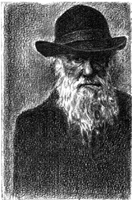
Notice
- This is an Archival Page.
For information regarding Darwin Week 2005, see: Darwin Week V
Welcome
to...
Darwin
Week in Charleston
February 9 - 12, 2004

The Public is Invited
to the fourth annual
observance of Darwin Week in Charleston. We've got an exciting line-up
of
events on the schedule! All are free. But arrive early - seats fill up
fast!
All
Talks are scheduled for
4:00 - 5:00 pm in Room 123 of the College of Charleston Science Center,
recently
named in honor of Rita Liddy Hollings. The CofC Science Center is
located
on the NE corner of Coming and George Streets. Parking is
available in
the
City Carage on the corner of St. Philip and George, two blocks east.
Each
talk will be followed by an opportunity to meet the speaker over
refreshments. Birthday party of Charles Darwin on Thursday!
Wednesday, February 11 - Dr.
Charles
Langmuir
Monday, February 9 - Dr. Albert H.
Keller
Science and Religion: Sworn Enemies, Just Friends, or Intimate
Partners?
Although they may have been close at one time, since the age of Galileo
(not to
mention Darwin), relations between science and religion have been
strained. Today there are those who still believe that if one domain is
right
about the origin and nature of human life, the other has got to be
wrong. Some scholars, however, take the view that the
centuries-old debate is obsolete and that both domains actually have a
great deal to say to each other. Some, cross-trained in
evolutionary biology and theology, have even drawn their science and
faith together in intimate intellectual partnership. Relations
are getting very interesting! Dr. Bert
Keller is
Associate Professor of Family
Medicine (Ethics) at MUSC and Pastor of
the Circular Congregational
Church in Charleston. He has studied theology at Union
Theological Seminary, Montpelier, Yale, and Princeton Theological
Seminary, where he earned his D. Min. Download Dr. Keller's Handout!
(pdf)
Tuesday, February 10 - Dr. David C.
McLean
Maternal and Paternal Population Genetic Affinities of Gullah-speaking
African Americans.
The Gullah-speaking African Americans inhabiting the coastal Sea
Islands of South Carolina and Georgia are directly descended from the
Africans enslaved to work colonial rice plantations. Anthropological
studies position the Gullah as retaining more African culture,
language, and tradition than other African Americans, thus making them
especially interesting to genetic epidemiologists, anthropologists, and
population geneticists. A genetic comparison of the Gullah
population to putative parental populations of Sierra Leoneans and
European Americans, along with comparisons to other New World
African-derived populations, is offered to provide an improved
foundation for genetic epidemiology studies. Dr. David McLean
is a postdoctoral fellow
in the Department of Biostatistics,
Bioinformatics, and Epidemiology at
MUSC.
Is Intelligent Life a Natural Consequence of Planetary Evolution?
Ever wonder how life on Earth began? Magmatic activity at ocean
ridges
can buffer seawater composition, enable the formation of continents,
and create
unique chemical environments suitable for the origin of life. Life
can evolve without sunlight, in the presence of volcanic heat and
water,
and can subsequently transform a planet through modification of the
atmosphere
and the composition of the crust. This leads one to question
whether
intelligent life is an abnormality in the universe, or whether it might
be
more commonplace than is generally supposed. Dr.
Charlie Langmuir is Professor
of Geochemistry
at Harvard University. He has explored the sea floor on over 20
cruises over the last two decades, and has discovered hydrothermal
sites in three ocean basins. NSF
Ridge 2000
Distinguished Lecture.
Thursday, Feb 12 - Dr. William M. Jackson
Comets, Messengers of the Past: Decoding the Message
A brief introduction to nature
and origin of comets will be given. Then it will
be shown how the results from ground, satellite,
and
spacecraft observations have expanded our knowledge about these
astronomical
bodies. Laboratory experiments that use
lasers to confirm the explanations of these observations will be
outlined. Dr.
Bill
Jackson
is Professor and Chair of the Department of Chemistry at the University
of
California, Davis. He has been a Guggenheim Fellow and has
received
many teaching and research awards, including a Humboldt Research Award
and
a Lifetime Mentor Award from the AAAS. Sigma Xi Distinguished Lecture.
Happy 195th Birthday C.D.!
Repeat Presentation of Dr.
Jackson's talk at The
Citadel - 6:40 pm, Thursday
Feb. 12. Grimsley Hall Auditorium, Room 117.
This page brought to you by:
Dr. Rob Dillon
Secretary, Charleston Chapter of Sigma Xi